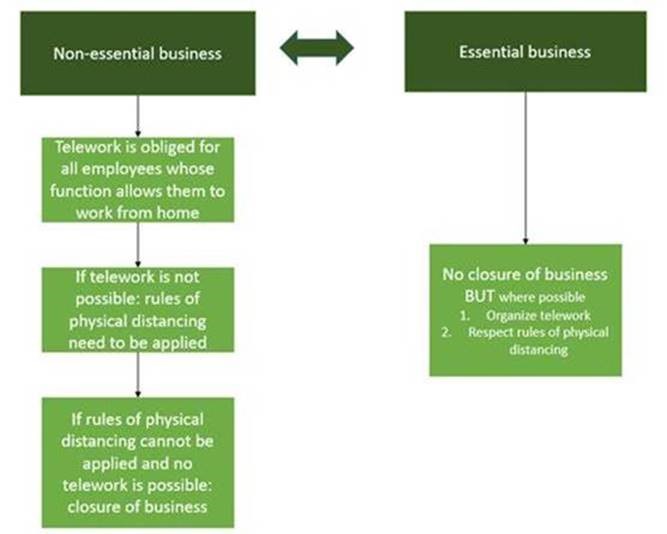Employment related questions with regard to the Coronavirus
What if the employees are infected by the coronavirus? What do they have to do? What is the impact on their employment agreement and benefits?
If an employee is infected by the coronavirus, he/she will stay at home and provide the employer with a medical certificate, like any other sick employee. Sick employees are entitled to a month of guaranteed income to be paid by the employer during the first month of incapacity to work due to sickness. After this month, they are entitled to sickness benefits. The amount varies and depends on (i) the family situation, (ii) the remuneration of the employee and (iii) the duration of the incapacity.
If his/her employer is required to close its business on the basis of the Ministerial Decree of 23 March 2020 (see below), the situation is different depending on whether the employee was already sick before (a) or after (b) the closure of the business (temporary unemployment due to force majeure):
- If the employee was already sick before the closure of the business, the employer is only required to pay guaranteed income to the employee up to and including the day before the start of the period of temporary unemployment. Only in case of a partial system of temporary unemployment the employer will continue to pay the guaranteed income to the employee. The employee will be entitled to receive sickness benefits from the sickness funds.
- If the employee becomes sick after the closure of the business and during the period of temporary unemployment, the employer will not have to pay guaranteed income, but the employee will immediately receive sickness benefits from the sickness funds.
Can the employees still come to the work place? What if the employees are being prevented from returning to the work place?
The Belgian government has issued several consecutive Ministerial Decrees, the last one being on 23 March 2020 regarding urgent measures to limit the spread of the coronavirus. These measures will at least apply until 19 April 2020. This Ministerial Decree has ordered to close all stores and shops with a few exceptions.
According to this Ministerial Decree all non-essential businesses are obliged to organize telework for all employees whose function allows them to work from home. If the function does not allow certain employees to do telework, it is possible for the employee to come to the work place on the condition that the employer can guarantee to organize the work (and transport organized by the employer) in a way that a physical distance of 1.5 m can be applied. If it is not possible to respect these conditions, the employer needs to close its business. The employees will in that case be temporarily unemployed.
All employees of essential businesses (e.g. hospitals, migration services, media, protection services, pharmaceutical industries,…) can continue to come to the workplace. However, they will do their best to organize telework and respect the rules of physical distancing.
If an employee is placed in quarantine and can therefore not come to the work place, force majeure (for medical reasons) can be invoked. In any event, the employees that are prevented from coming to the workplace are required to inform their employer. Otherwise, their absence can be considered to be unlawful.
Which (preventive) measures should or can the employer take?
The employer must make sure that the necessary health and safety measures are taken. For such necessary measures, the employer will seek the urgent advice of the Committee for Prevention and Protection at Work. If no such committee exists within the company, the employer should consult the trade union delegation and - in the absence of such a committee - the employees themselves.
It is practically recommended (cf. guidelines of the World Health Organization) that the employer appoints a person within the company who is responsible for planning crisis management in the event of a (risk of a) spread of the coronavirus. Such crisis planning can determine, among other things, which functions are essential for the continuity of the company and which resources can be used to ensure such continuity. Moreover, the responsible person exercises the function of a counsellor, whom the employees can call upon when they have any questions relating to the coronavirus.
Can the employer reorganize the work place and temporarily employ the employees in other premises of the company?
All employees of non-essential businesses need to telework, if their function allows them to do so. If no telework is possible, the employer needs to respect the rules of physical distancing, i.e. work needs to be organized in a way that a physical distance of 1.5 m between all employees is taken into account. In the light of this rule the employer can try to reorganize the workplace. An employer should however take into account that the workplace is an essential element that cannot substantially be changed in a unilateral way. It is advisable to ask for the employee’s consent and to foresee accompanying measures if changes are made. Of course, a certain flexibility can be expected taken into account the specific circumstances.
Can the employer control the health of his employees?
According to the Federal Public Service Employment, Labour and Social Dialogue (FPS), it is not allowed for an employer to request a medical certificate from employees returning from an area/country affected by the coronavirus.
If an employee returns to work after a period of contamination and/or quarantine, the employer can only ask the employee to be examined by the prevention advisor-doctor prior to resuming work if the employee himself agrees (except in case of a safety function in which case no consent is required).
If it is not certain whether the employee is infected by the coronavirus, but the employee poses clearly a serious and immediate risk of infection, the FPS recommends, if this is in the interests of the good health of all employees within the company, to consult the prevention advisor-doctor of the employer.
In case the employer wants to test employees (e.g. temperature testing), it is advisable to have a clear process that is discussed with the health and safety committee. The prevention advisor-doctor is in principle the person that should do/coordinate the testing. It is also advisable to ensure that the tests take place in an area where there is sufficient privacy for the employees concerned.
Can the employer oblige the employees to work from home?
In principle (in normal circumstances), the employee cannot be obliged to work from home. As mentioned above, the Belgian government has issued consecutive Ministerial Decrees (most recently on 23 March 2020) regarding urgent measures to limit the spread of the coronavirus. These measures will apply at least until 19 April 2020. This Ministerial Decree has obliged all non-essential businesses to organize telework for all employees whose function allows them to work from home. If the function does not allow certain employees to do telework, the employer is required to organize the work (and transport organized by the employer) in a way that the physical distance of 1.5 m can be applied. If it is not possible to respect these conditions, the employer needs to close its business. The employees will in that case be temporarily unemployed.
All essential businesses (e.g. hospitals, migration services, media, protection services, pharmaceutical industries,…) can continue to operate. However, they will do their best to organize telework and respect the rules of social distancing.
If a framework already exists that allows homeworking/teleworking, the employer can apply telework on the basis of these rules. If such framework does not exist, it is advisable to agree with the employees or their representatives on a framework. This framework should contain rules on availability of the employee, the frequency, the days on which telework will be organised, cost reimbursement rules and equipment.

Can the employer oblige the employees to take up leave?
Vacation days are taken up in mutual agreement between the employer and the employee. The process for taking up vacation days is determined in the works rules. It is not possible to oblige employees to take up their vacation days, as it is also not possible for employees to take up their vacation days without the consent of the employer. It is therefore always possible to ask employees to take up their vacation days but they cannot be obliged to do so.
If the employee’s leave was already approved and if the employee appears now to be temporary unemployed, he/she will not be entitled to the payment of unemployment benefits.
The employer can as well introduce a collective closure on the condition that his employees agree to this. If there exists a decision on collective closure at the level of the Joint Committee, the days of collective closure need to be notified to the Federal Public Service Employment, Labour and Social Dialogue at the latest on 31 December of the year, preceding the year in which the collective closure will take place.
If no notification before 31 December has taken place, the employer can decide the days of collective closure in consultation with the works council, or if no works council exists, in consultation with the trade union. In absence thereof the majority of the employees will be consulted. In principle, although not legally prescribed, this decision on collective closure is notified to the employees in time. The days of collective closure will be included in the works rules.
It is, however, possible (and advisable) to propose to an employee to take compensatory rest, if he/she has a right to this.
What if the employees refuse to come to work out of fear for corona infection and decide unilaterally to take up leave?
The employee can only take leave in consultation with the employer. If the employer does not agree with the (requested) leave, the employee is unlawfully absent from the workplace and his/her absence can be considered a refusal to work, without any right to allowances.
Can the employees stay at home to take care of their children and/or sick relatives?
When the employee wants to stay at home to take care of his/her children because of a closure of schools or to take care of his/her sick relatives, the employee has a right to unpaid leave for urgent reasons. Such leave for urgent reasons is allowed during the time necessary with in principle a maximum of 10 working days per year – when there are no deviations on sectoral level and depending on the type of employees (part-time or not).
The employer can always suggest to the employee to take leave or compensatory rest (if any). The employee can however not be forced to take such leave.
What are the financial consequences for the employer?
At current (1 April 2020) there are two systems of unemployment benefits when an employee cannot work: temporary unemployment due to force majeure (e.g. the employee cannot work because the Belgian government ordered the closing of the workplace) or due to economic reasons (economic impact of the Corona crisis). If the specific conditions/procedure for temporary unemployment (either for force majeure or for economic reasons) are complied with, the Belgian unemployment office (RVA/ONEM) will pay unemployment benefits (amounting to 70% of the average salary up until a maximum (i.e. capped) amount of EUR 2.754,76 in case of force majeure or 65% in case of economic reasons).
As the situation currently (1 April 2020) stands, the employer should in case of unemployment for economic reasons of white-collar employees, pay an additional amount on top on the unemployment benefits, as determined in a collective bargaining agreement/business plan. If no collective agreement or business plan exists, the employer will pay an amount of at least EUR 5 per day of temporary unemployment. For blue-collar employees, this additional amount is equal to at least EUR 2 per day of temporary unemployment, unless a sectoral collective bargaining agreement provides the payment of a higher amount to the blue-collar workers. If blue-collar workers in the company receive a higher amount because of the sectoral scheme applicable to them - or in the absence of blue-collar workers in the company if the joint committee that would apply if there were blue-collar workers - the supplement for white-collar workers will be at least equivalent to that of these blue-collar workers.
The authorities have now communicated that according to pending draft national measures a simplified procedure for unemployment for force majeure is applicable for employees. What is considered as force majeure in the Corona crisis will be largely interpreted. This system would be applicable between 13 March 2020 (retroactively) and 19 April 2020, even for the employee who is temporary unemployed for economic reasons. If certain formalities are complied with, the Belgian unemployment office (RVA/ONEM) will pay unemployment benefits for temporary unemployment Corona (amounting to 70% of the average salary up until a maximum threshold of EUR 2,754.76 per month, plus a supplement of EUR 5.63 per day on which no work was performed). The unemployment benefits and supplement will be subject to the withholding tax of 26.75%.
Several companies provide a supplement on top of the unemployment benefits and the amount of EUR 5.63 paid by the Belgian unemployment office (RVA/ONEM). Such an additional supplement is free from social security contributions but subject to a deduction of a withholding tax of 26.75%. The National Social Security Office does however, stipulate that the sum of the benefit received by the employee from the Belgian unemployment office (RVA/ONEM) and the supplement paid by the employer may not result in the employee receiving net more than he would have received if he had worked.
More about the coronavirus
You can read more publications on the impact of the coronavirus on our website. Here you will also find a list of contacts within our office who can advise you with questions about the implications of the coronavirus for your company.
This article provides some general insights on different legal questions. These insights do not constitute legal advice and may not be relied upon as if they were legal advice. The outcome of any legal analysis will strongly depend both on the specific facts and circumstances of each case and on the particularities of the sector and legal relationship involved. Our legal experts in the various domains concerned are available to assist you with the analysis of your questions and provide specific advice tailored to your case and circumstances.


